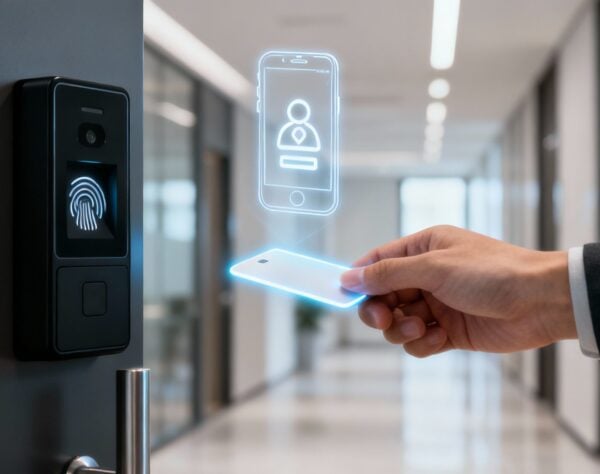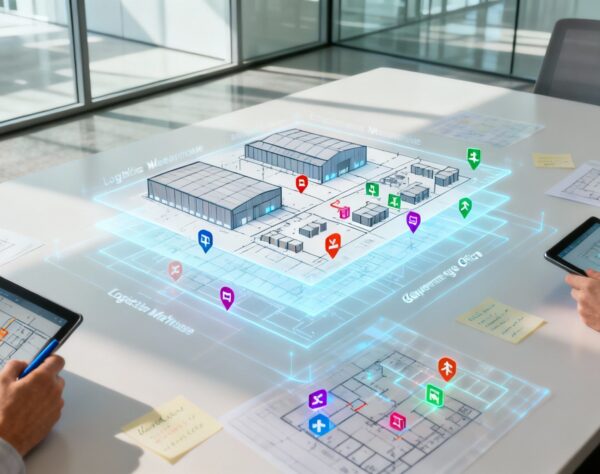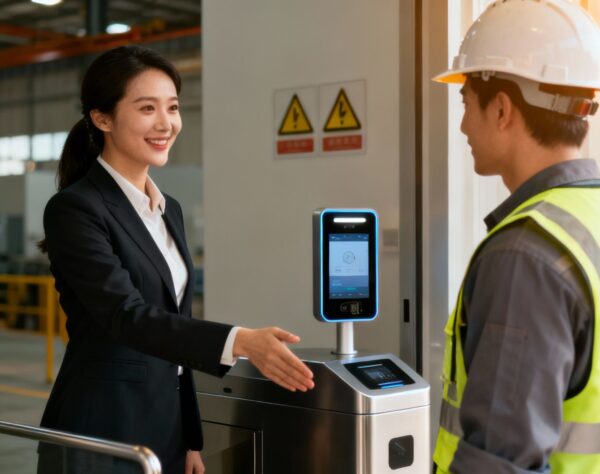
8 Core Front Office Manager Responsibilities in 2025
The role of a front office manager has evolved far beyond supervising check-ins and check-outs. In today's dynamic hospitality landscape, they are strategic leaders who blend exceptional guest service with sharp financial acumen. Statistics show that hotels with highly effective front office management see up to a 15% increase in guest satisfaction scores and a 10% rise in repeat business. A well-managed front office doesn't just create a welcoming first impression; it directly drives profitability and brand loyalty.
This article explores the eight core front office manager responsibilities that define success, highlighting how modern tools transform these duties into engines for growth. Leveraging a modern visitor management system amplifies a manager's effectiveness, turning potential operational chaos into a seamless guest experience. By automating check-in, hotels can reduce guest wait times by an average of 67%, freeing up staff to provide personalised, high-value service. This focus on smart systems delivers a tangible benefit: a front office that serves as a true command centre for outstanding hospitality.
1. Guest Relations and Customer Service Management
At the heart of the hospitality industry lies the guest experience, making this one of the most critical front office manager responsibilities. This duty involves orchestrating a seamless and memorable journey for every visitor. The front office manager sets the standard for service excellence, acting as the primary point of contact for guest concerns, special requests, and complaint resolution. A study by PwC found that 86% of buyers are willing to pay more for a great customer experience.
This role requires a proactive approach to shaping guest perceptions. By empowering the front desk team and establishing clear service protocols, managers cultivate an environment where guest satisfaction is the top priority. They are the chief problem-solvers, turning potentially negative experiences into opportunities to demonstrate exceptional care and build lasting loyalty. A positive experience is so powerful that 72% of customers will share it with six or more people.
Implementing Service Excellence
Successful guest relations management is a structured and intentional strategy. Top-tier hotel brands provide excellent blueprints for implementation.
- Empowerment for Resolution: The Ritz-Carlton famously empowers its staff to spend up to $2,000 per guest to resolve an issue. This policy removes delays and allows for immediate, impactful service recovery.
- Proactive Personalisation: At Four Seasons hotels, front office managers use detailed guest profiles to orchestrate personalised welcome amenities and anticipate needs, ensuring guests feel uniquely valued from the moment they arrive.
- Technological Integration: Marriott's managers leverage the Bonvoy app to streamline processes like mobile check-in and communicate directly with guests, offering a modern, efficient, and personalised service model.
Actionable Tips for Superior Guest Relations
To elevate your hotel's service standards, integrate these proven tactics into your daily operations:
- Implement the 10-5 Rule: Train all front-facing staff to acknowledge guests with eye contact and a smile at 10 feet and offer a warm, verbal greeting at 5 feet.
- Conduct Daily Huddles: Start each shift with a brief meeting to review VIP arrivals, note special requests, and align the team on service goals for the day.
- Use Guest History: Leverage your property management system (PMS) to review guest history, anticipating preferences for room location, amenities, or services before they even ask.
- Follow Up Personally: Make a point to personally contact guests who experienced any issues during their stay. A simple phone call or personalised email can transform a negative memory into a positive one.
Effective guest relations management directly impacts key performance indicators that define a hotel's success. This infographic summarises the crucial metrics every front office manager should monitor.
Achieving these benchmarks signifies a healthy, guest-centric operation that not only retains existing customers but also attracts new ones through positive word-of-mouth and strong online reviews.
2. Staff Supervision, Training, and Development
A hotel’s front office team is its public face, and the manager is the architect of that team's success. This crucial responsibility involves recruiting, training, scheduling, and mentoring the entire front desk staff. The manager cultivates a positive and efficient work environment, ensuring the team is equipped and motivated to deliver exceptional service. Organisations with highly engaged employees outperform their competitors by 147%.
They are responsible for creating comprehensive training programmes, managing schedules for optimal coverage, and conducting performance evaluations. By fostering a culture of continuous improvement, a front office manager directly influences staff retention and morale. This leadership ensures that every team member acts as a brand ambassador, improving the overall quality of the guest experience.
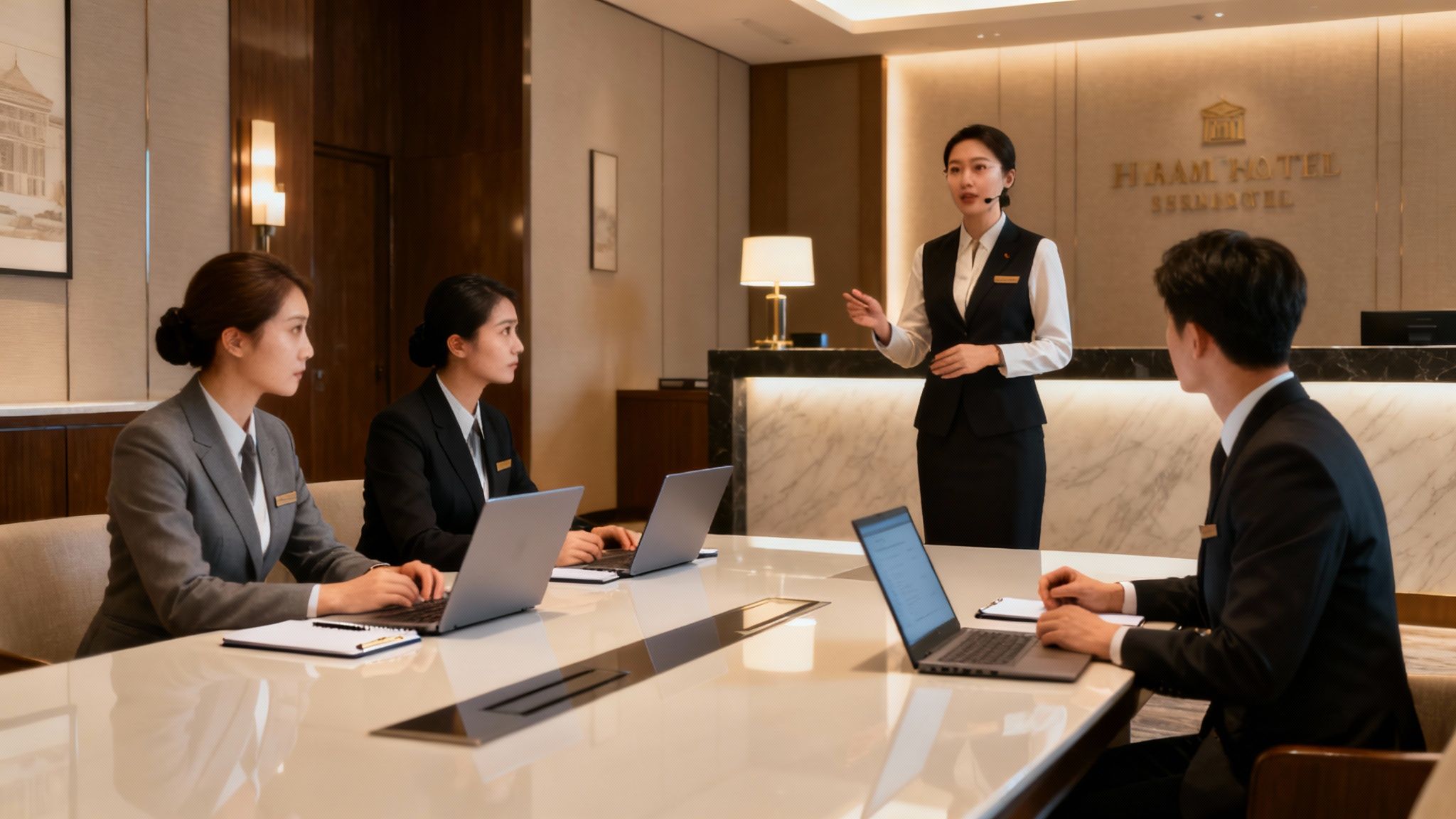
Implementing Service Excellence
Effective team leadership is built on structured development and clear, supportive processes. Leading hotel chains provide excellent models for developing a high-performing front office team.
- Standardised Certification: Hilton's Front Office Manager Certification Program provides standardised, world-class training across all its properties, ensuring brand consistency and operational excellence.
- Mentorship Programmes: Hyatt champions professional growth through its 'Colleague Promise' program. Front office managers actively mentor their team members, creating clear pathways for career advancement within the company.
- Brand-Specific Training: Airbnb Plus hotels require front office managers to complete a specialised hospitality standards training program, guaranteeing the team can deliver a unique and consistent guest experience.
Actionable Tips for Superior Team Leadership
To build a motivated and skilled front office team, integrate these proven strategies into your management approach:
- Implement Cross-Training: Train staff to handle multiple roles (e.g., receptionist and concierge duties). This provides flexibility during busy periods and enhances employee skill sets.
- Use Role-Playing Scenarios: During training sessions, use role-playing to prepare staff for handling difficult guest situations. This builds confidence and ensures a consistent, professional response under pressure.
- Create a 30-60-90 Day Plan: Establish a structured onboarding plan for new hires with clear goals and benchmarks for their first three months to ensure they integrate smoothly. A key part involves dedicated training for reception staff to set them up for success.
- Recognise and Reward Excellence: Publicly acknowledge team members who provide exceptional service. Companies that recognise employees see a 60% increase in engagement.
3. Revenue Management and Financial Oversight
Beyond guest-facing duties, one of the most vital front office manager responsibilities is steering the hotel's financial performance. This involves strategic pricing, inventory control, and meticulous financial oversight to maximise revenue. The front office manager is on the front line of profitability, directly influencing key metrics like occupancy, Average Daily Rate (ADR), and Revenue Per Available Room (RevPAR).
This role requires a sharp analytical mind and an understanding of market dynamics. By collaborating with the revenue team and managing daily financial operations, the manager ensures the front office functions as a powerful revenue-generating engine. Effective revenue management can increase a hotel's revenue from 2% to 8%. Fundamental to this, managers must grasp principles such as understanding what is revenue management in rental properties and applying similar concepts to hotel operations.
Implementing Service Excellence
Effective financial stewardship is built on data-driven decisions and empowered teams. Leading hotel groups provide excellent models for how front office managers can drive financial success.
- Real-Time Rate Adjustment: At IHG properties, front office managers use sophisticated revenue management systems to adjust rates in real-time based on local demand drivers, ensuring they never miss an opportunity to optimise pricing.
- Dynamic Upselling: Boutique brands like Kimpton empower their front office managers to offer dynamic, last-minute paid upgrades. This strategy not only enhances the guest experience but also maximises RevPAR on any given night.
- Predictive Analytics: MGM Resorts' front office managers leverage predictive analytics to forecast demand. They adjust rates months in advance based on convention bookings and entertainment schedules to secure optimal revenue.
Actionable Tips for Superior Guest Relations
To enhance your hotel's financial health, integrate these proven strategies into your front office operations:
- Review Pace Reports Daily: Analyse booking trends against historical data to identify revenue opportunities or potential shortfalls early.
- Implement Upselling Scripts: Equip front desk staff with structured scripts for offering room upgrades or add-on packages, turning every check-in into a potential revenue boost.
- Monitor Competitor Rates: Use rate shopping tools to check competitor pricing at least twice a day, allowing for agile adjustments to your own strategy.
- Create Value-Driven Packages: Bundle room nights with services like breakfast or parking. This increases the perceived value for guests and drives higher overall spend.
- Analyse Cancellation Patterns: Study no-show and cancellation data to refine overbooking strategies, minimising revenue loss from last-minute changes.
4. Reservation Management and Occupancy Optimisation
A core technical function among front office manager responsibilities is the meticulous management of reservations and the strategic optimisation of hotel occupancy. This involves managing a complex web of distribution channels, ensuring inventory accuracy, and implementing pricing strategies to maximise revenue. The manager oversees the entire reservation lifecycle, from booking to confirmation, ensuring a smooth process.
This role requires a deep understanding of the hotel's property management system (PMS) and its connections to booking platforms. By carefully controlling room inventory, managing rates, and coordinating with different sales channels, the manager directly influences the hotel's profitability. Hotels that effectively manage online distribution channels see an average occupancy rate increase of 10-20%. They are the guardians of the hotel's most perishable asset: its rooms.
Implementing Service Excellence
Effective reservation management is a blend of technology and strategy. Leading hotel brands showcase how to turn this operational task into a competitive advantage.
- Centralised System Mastery: Marriott’s front office managers use MARSHA, a sophisticated central system that provides a real-time, global view of inventory, enabling precise control over bookings and rates.
- Channel Integration: At many independent hotels, front office managers monitor the live integration between their PMS and Online Travel Agencies (OTAs) to ensure rate parity and prevent overbookings.
- Dynamic Packaging: Wyndham properties often empower front office managers to implement dynamic packaging strategies, bundling rooms with amenities to enhance value and drive direct bookings, capturing a higher revenue per guest.
Actionable Tips for Superior Guest Relations
To refine your reservation management and boost occupancy, integrate these proven tactics into your daily workflow:
- Conduct Daily System Audits: Perform daily checks to ensure rate and inventory accuracy across all channels, from your hotel’s website to every connected OTA.
- Establish a Walk Protocol: Create a clear, professional procedure for managing overbooking situations. This should include arrangements with nearby hotels and compensation plans to maintain guest goodwill.
- Utilise Reservation Notes: Train staff to meticulously use the notes field in the PMS to capture special requests and guest preferences that can personalise a future stay.
- Monitor Booking Pace: Regularly analyse booking trends and pace reports to identify high-demand periods, allowing you to proactively adjust rates and set restrictions like minimum stays.
5. Operational Coordination and Interdepartmental Communication
The front office is the nerve centre of a hotel, and the manager is its chief conductor. This aspect of front office manager responsibilities involves orchestrating seamless collaboration between all departments, from housekeeping and maintenance to food & beverage. The manager acts as the primary information hub, ensuring that every team is aligned with guest needs and property goals.
This role requires exceptional organisational and communication skills. Businesses with effective communication are 50% more likely to have lower employee turnover. By establishing clear communication channels, the front office manager prevents operational silos and ensures a unified approach to service delivery. They are the linchpin that holds the entire hotel operation together, transforming disparate departmental efforts into a single, cohesive guest experience.
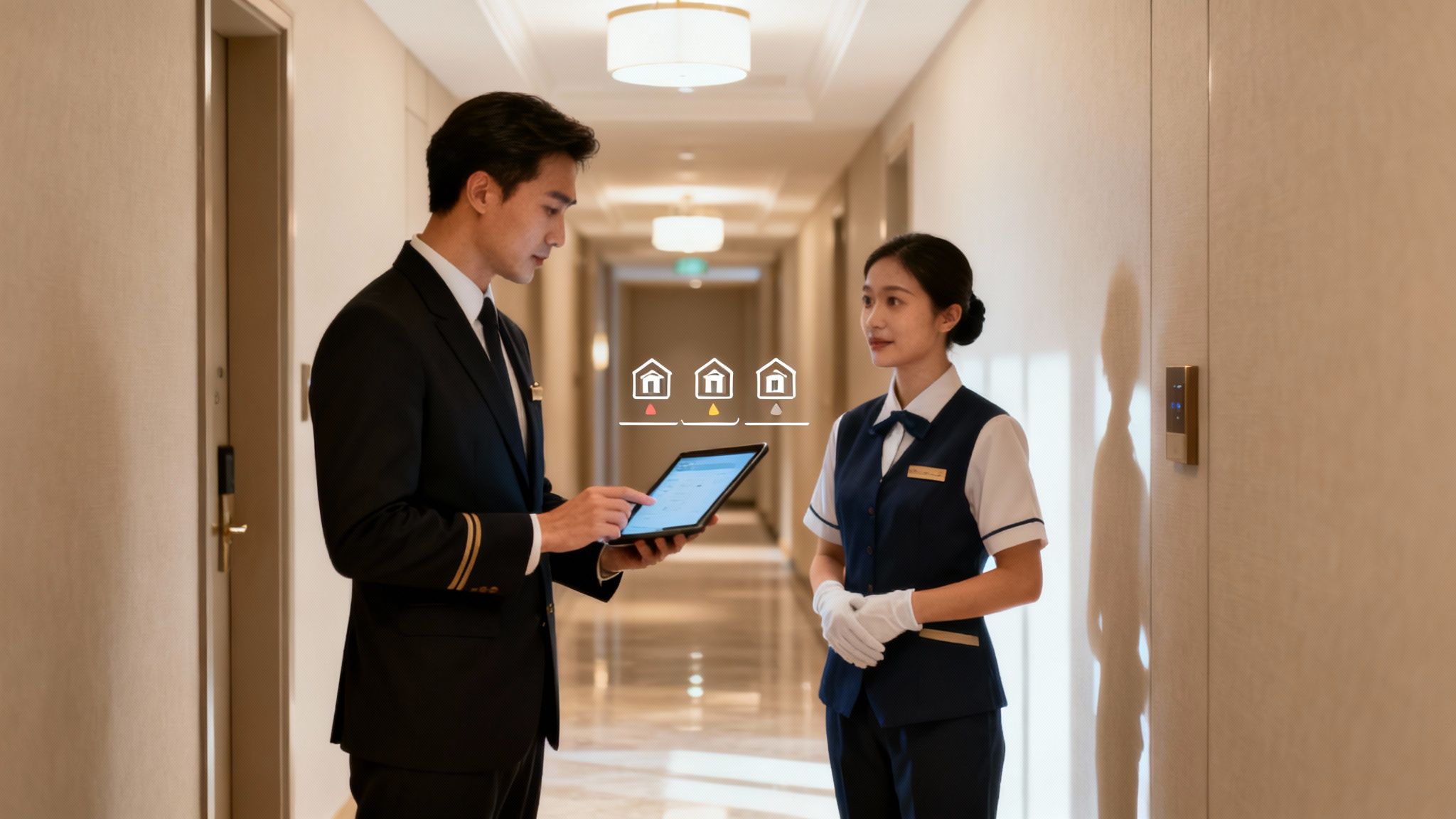
Implementing Service Excellence
Effective interdepartmental coordination is a hallmark of world-class hotels, often achieved through structured communication strategies.
- Standardised Meetings: Westin properties often use "Morning Wake-Up" meetings, led by the front office manager, where department heads gather to synchronise activities and review VIP arrivals.
- Rapid Response Protocols: At some Disney hotels, a '15-minute response rule' is implemented. Front office managers ensure any request logged for another department is actioned within 15 minutes, dramatically improving efficiency.
- Integrated Technology: Mandarin Oriental properties use integrated communication platforms. These systems, overseen by the front office manager, allow guest requests to be shared instantly across departments for consistent, personalised service.
Actionable Tips for Superior Coordination
To enhance collaboration and operational flow at your property, integrate these proven tactics:
- Use a Shared Platform: Implement a tool like Slack or a hotel-specific application for real-time updates, eliminating communication delays between shifts and departments. For managing incoming goods, an effective delivery management system can further streamline these processes.
- Standardise Handover Reports: Create a clear, concise handover report template for shift changes, ensuring critical information about guest issues and pending tasks is never missed.
- Schedule Daily Huddles: Conduct brief, consistent daily meetings with key personnel from housekeeping, maintenance, and F&B to align priorities for the day ahead.
- Develop Escalation Protocols: Establish clear guidelines for when and how front desk staff should escalate issues to other departments, empowering them to solve problems efficiently.
6. Technology Systems Management and Digital Innovation
In the modern hotel, the front office manager is a steward of technology. This responsibility involves overseeing a complex ecosystem of digital tools central to efficiency and the guest experience. From the Property Management System (PMS) to keyless entry and guest communication platforms, the manager ensures these systems run smoothly and are used to their full potential.
This role requires a blend of technical aptitude and strategic vision. The manager not only maintains current systems but also identifies new technologies that can enhance efficiency and guest satisfaction. By mastering these digital tools, they empower their team to deliver a faster, more personalised service. In fact, 67% of hotel guests report a better experience when they can use technology.
Implementing Service Excellence
Leading hotel brands demonstrate how technology, when managed effectively, can revolutionise the front office.
- Seamless Guest Journey: Hilton’s Digital Key technology, managed by front office teams, allows guests to bypass the desk entirely. This innovation is now available in over 5,000 properties.
- Efficient Self-Service: CitizenM hotels use self-service check-in kiosks overseen by front office 'ambassadors'. This approach reduces check-in to under a minute, freeing up staff for meaningful guest interactions.
- Robotic Process Automation: At YOTEL, front office operations coordinate robotic luggage storage systems (YOBOT), an innovative solution that securely manages guest belongings and adds a unique, futuristic touch.
Actionable Tips for Superior Guest Relations
To leverage technology effectively, integrate these proven tactics into your management strategy:
- Conduct Monthly System Audits: Regularly review your PMS to identify and correct data inconsistencies, ensuring accuracy for guest profiles and billing.
- Create Quick-Reference Guides: Develop simple, one-page guides for staff on common system procedures and troubleshooting steps to minimise downtime.
- Balance Tech with Personal Touch: Use technology to handle transactional tasks so your team can focus on genuine human connection. Technology should enhance, not replace, personal service.
- Stay Informed on Innovation: Keep up-to-date with emerging trends by reading industry publications. Understanding the strategic role of artificial intelligence in hospitality can prepare you for the next wave of operational enhancements.
Effective management of these systems is crucial. By embracing these responsibilities, managers can significantly improve operational workflows and elevate the overall guest experience.
7. Safety, Security, and Compliance Management
A core front office manager responsibility is the unwavering commitment to the safety and security of guests, staff, and the hotel. This duty requires managers to be vigilant custodians of well-being and regulatory adherence. They are tasked with implementing robust security protocols, managing emergency procedures, and ensuring the property complies with all regulations.
This role places the manager at the centre of risk mitigation and crisis management. From safeguarding guest privacy to coordinating with law enforcement, they must create a secure environment that guests and employees can trust. Effective management in this area protects people and assets while defending the hotel's reputation. A single data breach can cost a hospitality company an average of $3.4 million.
Implementing Service Excellence
A safe environment is built on proactive planning and rigorous training. Leading hotel brands demonstrate how to integrate these principles seamlessly into front office operations.
- Heightened Security Protocols: Following major security events, brands like MGM Resorts International empowered front office managers to oversee enhanced protocols, including more stringent room access verification.
- Comprehensive Staff Training: Hyatt has championed human trafficking awareness training for its front office teams. Managers ensure staff can identify warning signs and follow precise reporting protocols.
- Regulatory Compliance: European hotels, guided by their front office managers, successfully implemented strict GDPR compliance measures. This involved overhauling data handling processes at the front desk to protect guest information.
Actionable Tips for Superior Guest Relations
To fortify your hotel's safety and compliance framework, integrate these proven tactics:
- Conduct Monthly Security Audits: Regularly review front desk procedures, key control, and physical access points to identify and rectify potential vulnerabilities.
- Train for Human Trafficking Awareness: Equip your team to recognise the subtle signs of human trafficking and domestic violence, establishing clear reporting channels.
- Maintain Detailed Incident Logs: Document every security or safety incident with the date, time, a clear description of events, and all actions taken.
- Execute Regular Emergency Drills: Run quarterly drills covering various scenarios, like fire or medical emergencies, during different shifts to ensure the entire team is prepared. To develop a robust plan, learn more about emergency evacuation procedures for the workplace.
8. Reports, Analytics, and Performance Management
Beyond guest interactions, a vital front office manager responsibility is transforming raw operational data into strategic business intelligence. This involves generating, analysing, and acting upon reports covering key performance metrics. The manager serves as a crucial link, translating daily numbers into actionable insights for senior management.
This analytical duty requires a keen eye for detail and an understanding of what drives hotel performance. Data-driven organizations are 23 times more likely to acquire customers. By meticulously tracking metrics like occupancy, RevPAR, and guest satisfaction scores, the manager can identify trends, forecast future performance, and make informed decisions. They are responsible for painting a clear, accurate picture of the front office's financial and operational health.
Implementing Service Excellence
A data-centric approach is a hallmark of highly successful hotel operations. Leading hotel brands demonstrate how to leverage analytics effectively.
- Real-time Performance Tracking: At Best Western properties, front office managers use the BW Analytics dashboard, a powerful tool that tracks over 30 performance metrics in real-time.
- Competitive Benchmarking: Independent hotels often rely on STR (Smith Travel Research) reports. Front office managers analyse these monthly to benchmark their property's performance against a competitive set.
- Daily Revenue Accountability: Accor hotels implement a strict reporting discipline, requiring front office managers to submit daily revenue reports detailing the previous day's performance against budget and forecast.
Actionable Tips for Superior Guest Relations
To enhance performance through effective reporting, integrate these proven strategies:
- Automate and Schedule: Use your PMS to automate repetitive tasks. You can set up automated daily and weekly reports to ensure consistency and save valuable time.
- Create Executive Summaries: Begin every report with a concise summary highlighting the most critical takeaways, trends, and recommended actions for busy executives.
- Visualise Your Data: Use simple charts and graphs to make complex data on occupancy, ADR, and revenue easily digestible for your team and management.
- Focus on Leading Indicators: Monitor leading indicators such as booking pace and cancellation rates to anticipate future performance and proactively address potential shortfalls.
Front Office Manager Responsibilities Comparison
| Functionality | Implementation Complexity 🔄 | Resource Requirements ⚡ | Expected Outcomes 📊 | Ideal Use Cases 💡 | Key Advantages ⭐ |
|---|---|---|---|---|---|
| Guest Relations and Customer Service | Medium – requires 24/7 availability | Moderate – skilled staff with training | High guest satisfaction and loyalty | Handling guest interactions, complaint resolution | Builds loyalty, enhances reputation |
| Staff Supervision, Training, Development | High – ongoing training and scheduling | High – dedicated HR/training resources | Consistent, skilled, and motivated team | Recruiting, training, performance management | Improves service quality, reduces turnover |
| Revenue Management and Financial Oversight | High – complex pricing and analysis | Moderate – data systems & analytics | Improved profitability and optimized revenue | Pricing strategies, forecasting, billing accuracy | Data-driven revenue growth |
| Reservation Management and Occupancy Optimization | High – technical PMS and channel management | High – multi-system monitoring | Maximized occupancy, reduced errors | Managing booking channels and inventory | Accurate reservations, improved forecasting |
| Operational Coordination and Communication | Medium – multi-department liaison | Moderate – communication tools & meetings | Smooth operations, faster problem resolution | Interdepartmental coordination | Prevents bottlenecks, enhances accountability |
| Technology Systems Management & Innovation | High – requires technical expertise | High – IT systems & continuous training | Increased efficiency, enhanced guest experience | Managing PMS, guest tech, data security | Reduces errors, supports innovation |
| Safety, Security, and Compliance | High – strict protocols and training | Moderate – security systems & training | Protected guests/staff, legal compliance | Security, emergency response, regulatory compliance | Ensures safety, reduces liability |
| Reports, Analytics, & Performance Mgmt | Medium – regular data collection and analysis | Moderate – reporting tools & staff time | Data-driven decisions and strategic planning | Performance monitoring and forecasting | Identifies trends, optimizes resources |
Elevating the Front Office: From Management to Strategic Leadership
The role of a front office manager has evolved far beyond supervising check-ins. Today, the position is a strategic hub where guest relations, financial oversight, operational efficiency, and team leadership converge. Mastering modern front office manager responsibilities is about transforming a department into a powerful engine for growth, guest loyalty, and operational excellence. It requires a leader who is as comfortable analysing revenue forecasts as they are mentoring a new staff member.
This comprehensive set of duties demands a shift in perspective. The most effective front office managers are strategic thinkers who understand how their department’s performance directly influences the entire organisation's bottom line. They recognise that exceptional guest service isn't just a goal; it's a key performance indicator. Research consistently shows that a positive guest experience is a primary driver of repeat business, directly impacting long-term profitability.
Key Takeaways for the Modern Front Office Leader
To truly excel, a front office manager must move beyond simply overseeing daily tasks and embrace a more holistic, strategic approach. Here are the core principles to prioritise:
- Embrace Data-Driven Decision Making: Leverage analytics from your operational systems to understand guest behaviour, occupancy trends, and revenue patterns. This data is crucial for optimising everything from staff scheduling to pricing strategies.
- Invest Relentlessly in Your Team: Your front office staff are the face of your organisation. Continuous training and professional development are not expenses; they are investments in quality and guest satisfaction. A well-supported team is an empowered team.
- Prioritise Seamless Interdepartmental Communication: The front office is the central nervous system of any hospitality operation. Fostering strong, collaborative relationships with other departments ensures a smooth, unified guest experience.
- Champion Technology as an Enabler, Not a Replacement: The benefit of technology is automating the mundane so your team can humanise the memorable. A modern system frees up valuable time for genuine guest interaction and proactive problem-solving.
Ultimately, the journey from a good front office manager to a great one lies in the ability to balance these diverse responsibilities with a clear vision. It’s about creating an environment that is not only efficient and profitable but also welcoming, secure, and consistently impressive. This strategic leadership is what elevates the front office from a cost centre to a cornerstone of organisational success.
Ready to empower your front office team and streamline your operations? Discover the benefits of a modern visitor management system like VisitUs. You can automate routine check-ins, enhance security protocols, and gain valuable visitor analytics, freeing your manager to focus on strategic leadership. Explore the benefits and book a demo at VisitUs today.


